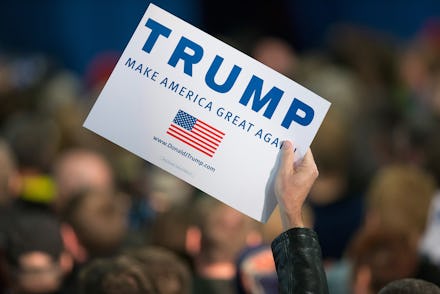Why Donald Trump's Ideas Are More American Than You Think

Donald Trump appears to be facing the very smear that he has wielded against his opponents with extraordinary success: being un-American.
On Monday, the real estate mogul called for a "total and complete shutdown of Muslims entering the United States." Political leaders across the political spectrum have not just condemned his position, but cast it as emblematic of an unforgivably un-American ethos. Former Vice President Dick Cheney said Trump's proposal "goes against everything we stand for and believe in." House Speaker Paul Ryan said, "This is not who we are as a party or a country." Democratic presidential candidate Martin O'Malley excoriated Trump as a "fascist demagogue."
From the very launch of his remarkable bid for the White House, defining American identity narrowly has been the fulcrum of Trump's candidacy. But at this point the concept seems to be boomeranging back at him, and could be key to a fall from grace.
Yet as common as it is to slam Trump for crossing some kind of uncrossable line, it's important to recall that his stances on immigration or his previously stated interest in a database for tracking Muslims aren't unprecedented. There are a number of episodes in American history in which an ethnic group has been singled out and shunned or persecuted by the state, all under the auspices of the law.
The Chinese Exclusion Act effectively banned all Chinese immigration for more than half a century, and Japanese internment camps — established by arguably the most powerful liberal of the 20th century — stripped U.S. citizens of many of their most basic rights. Today those events are widely considered dark chapters in American history, but they're real threads in the political and cultural heritage of this country. And they might help explain why Trump is tremendously popular today.
Chinese Exclusion Act: The Chinese Exclusion Act was signed into law in 1882 by President Chester Arthur, becoming the first federal law in American history to ban a specific ethnic group from entering the U.S.
The law was the product of nativist hostility against Chinese immigrants that had been brewing for decades. The California Gold Rush in the 1840s attracted large numbers of Chinese immigrants to the West coast, and they were met with anything but open arms. Native-born Americans perceived them as a threat to their jobs, wages and way of life, and many put considerable energy into excluding them from society. The Workingman's Party of California in the 1870s rallied behind a blunt slogan: "The Chinese must go!"
The 1882 federal law was originally designed to last 10 years, but became permanent in 1902 and lasted until its repeal in 1943, when China joined forces with the U.S. in World War II.
But the terms of that 1943 repeal only opened up Chinese immigration to 105 immigrants a year. Another set of immigration laws passed in the 1920s had created national origin quotas and included an "Asiatic Barred Zone." Restriction on the influx of Chinese immigrants and the general national origins quota system was not done away with until 1965.
All told, the Chinese, a nationality tightly interwoven with the evolution of American culture, were singled out by the immigration system for the better part of a century.
Japanese internment camps: The other major stance by Trump that has earned him the harshest criticism and the label of "fascist" have been his remarks about a database for registering Muslim Americans, which some have described as a preface to the kind of ethno-religiously-based persecution that led to the rise of Nazism.
Here, too, one does not have to look abroad for precedent. Two months after the bombing of Pearl Harbor, President Franklin Roosevelt began the rounding up and incarceration of over 100,000 people of Japanese descent, both citizens and non-citizens. Families were uprooted, business were shuttered and lives were ruined as the government forged a new precedent for what the government could force residents to endure under the banner of national security. The last camp did not close until 1946. Decades later, President Ronald Reagan officially apologized for the act and provided reparations to compensate those who were incarcerated, but the legacy of the camps lives to this day.
Trump implied he was cognizant of this tradition during an interview on Morning Joe when describing his proposition to bar Muslims from the U.S. Defending his idea from criticism, he said that "we're not talking about internment" and that his proposal was meant to be "temporary."
But as MSNBC reported: "Asked if his proposal goes against long-held American values, he responded: 'No, because FDR did it!'"